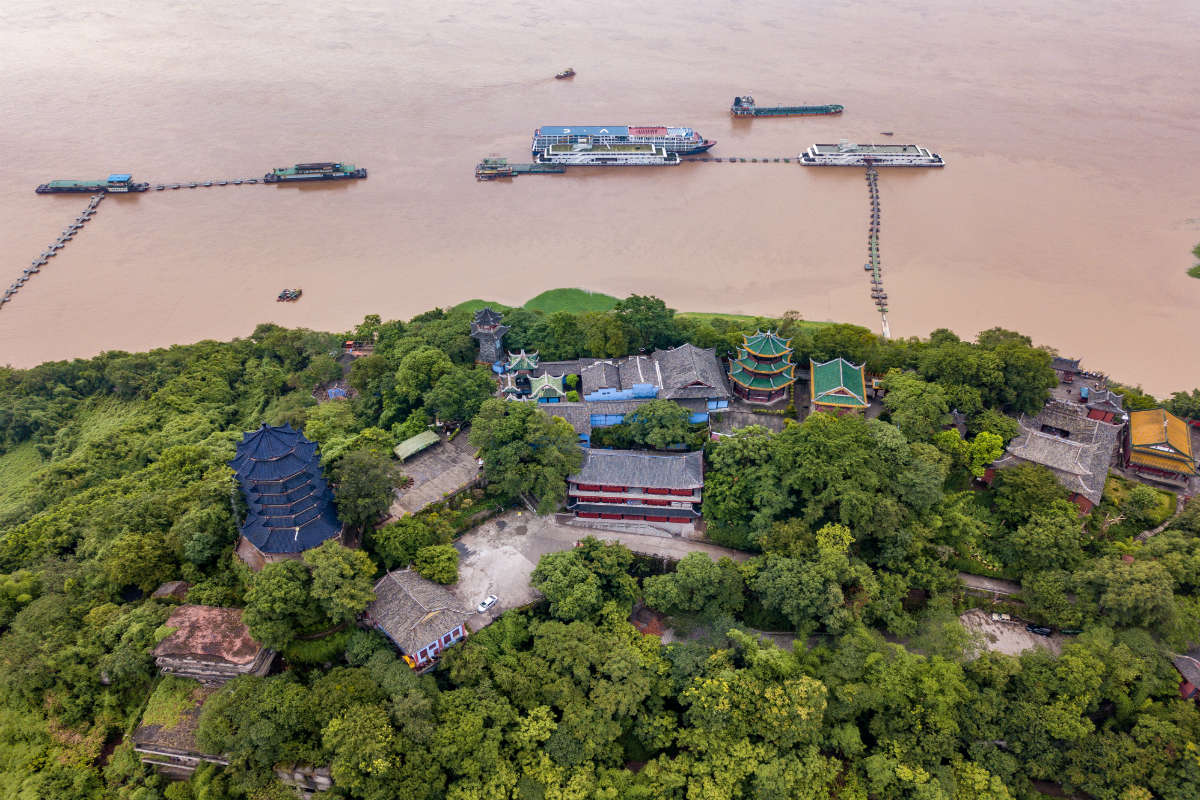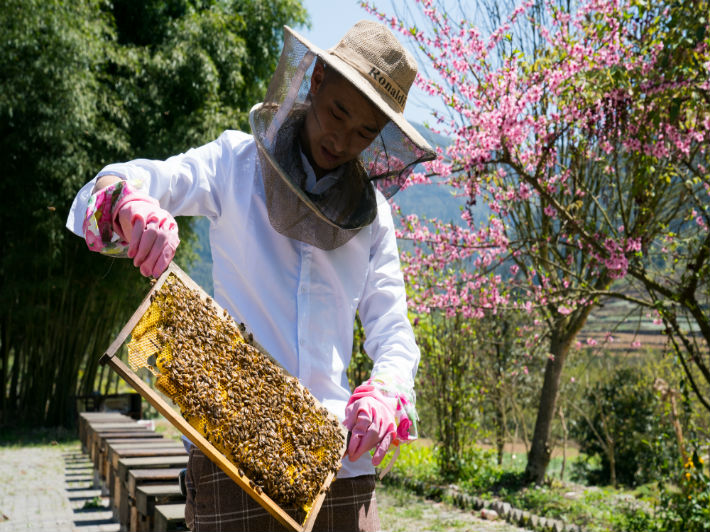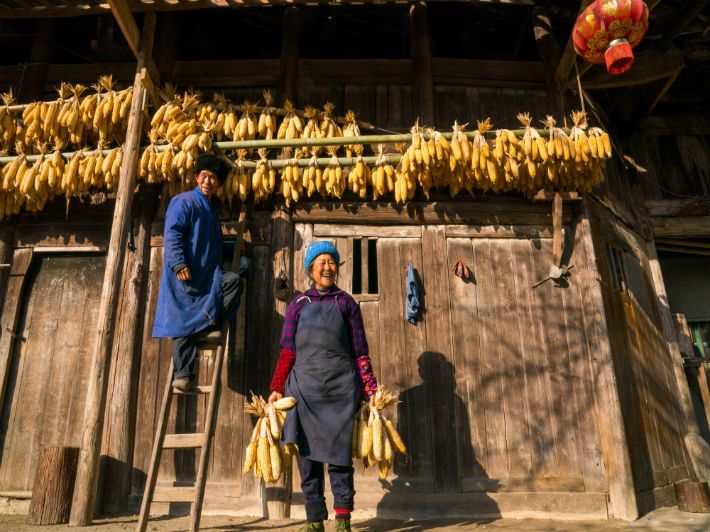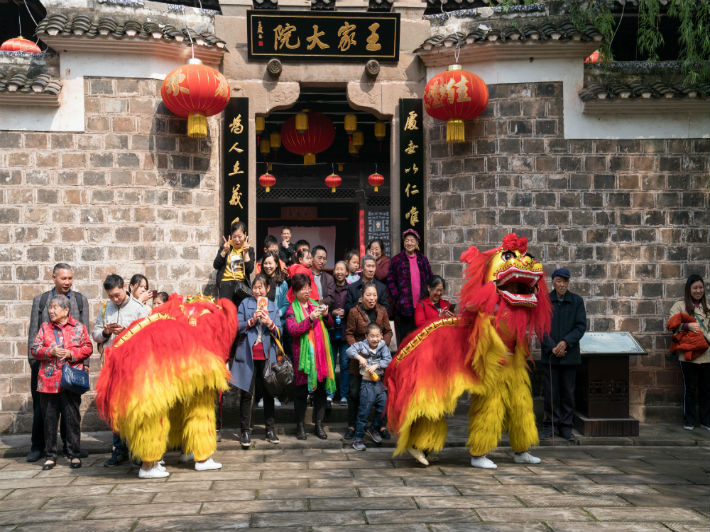Rise of “Ghost City”

Fengdu County in southwestern China’s Chongqing Municipality has been known as the “Ghost City” in China because according to superstitious legends, “the dead come to Fengdu and the devils go to hell.” As one of the most famous places of interests on the Yangtze River tourism corridor, Fengdu is a treasure trove of Chinese folk culture and art integrating Confucianism, Taoism and Buddhism.
Many years ago, however, some were uneasy about Fengdu, because of “three fears” of the county: fear of distance, fear of poverty and fear of “ghosts.”
In September 2011, Cao Ling, then deputy chief of Shuangqiao District of Chongqing, visited Fengdu for the first time. “With a population of more than 500,000, the county only has one movie theater,” she reported. “The poverty of the Fengdu people is more of a spiritual issue.” The four-hour drive from Chongqing to reach Fengdu helped her deeply realize the “distance” between the county and downtown Chongqing.
“Poverty” and “distance” limited imaginations about Fengdu. Some even regarded the “Ghost City” as a bleak and horrible place.
“In fact, Fengdu’s ghost culture focuses on punishing evil and promoting good as it encourages good deeds and practice of virtues,” Cao explained. “When you visit the county and start to understand it, your fears will seem silly.”
Two months later, Cao became a member of the Standing Committee of the Communist Party of China (CPC) Fengdu County Committee. “Just a few months after assuming office, I saw the government relocate two chemical enterprises that were contributing about half of Fengdu’s GDP to promote greener development along the Yangtze River,” she recalled.
Now, nearly eight years have passed. The number of cinemas in Fengdu has grown to five. And the driving time from Chongqing to Fengdu has been cut to less than two hours.

However, the focus of the local government’s work—poverty alleviation and green development—has not changed. Today, Fengdu is looking to live up to its name, “the land of harvest,” through various forms of industrial poverty alleviation.
Priceless Clear Waters and Lush Mountains
In April 2019, when inspecting Chongqing, President Xi Jinping stressed that Chongqing should play an exemplary role in promoting the green development of the Yangtze River Economic Belt.
Fengdu is situated in the Three Gorges Reservoir area. The Yangtze River runs through the county for 47 kilometers, and 2,901 square kilometers of its land is rich in rainfall resources. However, the good natural ecological environment was once coupled with substandard ecological conservation.
Chen Xingwen, 56, now owns a seedling base in Daxi Village, Huwei Town of Fengdu County, after leaving his career managing a plastic factory.
In 1996, Fengdu began to vigorously develop township enterprises. Chen, who had worked in plastic factories for years and thoroughly knew production skills and procedures, established a plastic factory in his hometown. However, plastic factories including Chen’s heavily polluted the local environment, making their development unsustainable.

In 2002, Chen changed careers to seedling cultivation. He planted 1.65 acres of land with garden seedlings in Daxi Village.
After years of exploration, Chen’s seedling farm has gradually evolved into a green industry that drives the economic development of the whole village. His annual net income from selling seedlings alone reaches more than 100,000 yuan (about US$14,500).
However, he still wasn’t satisfied with this success. Over the past two years, Chen has been helping villagers grow honey pomelo, kumquat, loquat, kiwifruit and other fruit trees on the mountains.
“We want to make good use of our ecological resources to accelerate economic growth, which is our late-mover advantage,” Cao stated with reference to “clear waters and lush mountains.” The county is vigorously developing green industries in areas with rich rainfall such as a red pomelo cultivation corridor, a bamboo shoot industrial park, pepper farms and longan picking gardens. “Efforts will be made to build three eco-economic zones in the Yangtze River, Longhe River and Quxi River basins to contribute to the sustained development of the eco-economy of the Yangtze River Economic Belt,” she added.
Small Town, Big Business
Nowadays, Hondo beef can be found in most supermarkets in Beijing, Chongqing and Sichuan. In 2009, the Fengdu government joined hands with Zhongheng Xingye Technology Group headquartered in Beijing to invest 1 billion yuan (about US$145 million) to found Hondo Company to comprehensively develop beef production.
In four years, the company has become a juggernaut based in Fengdu with influence on the surrounding districts, counties and even provinces. Hondo Company was later granted the title of national leading enterprise in agricultural industrialization. Several other local enterprises such as Xinben and Guangming have also joined the pioneering team to help develop the beef industry in Fengdu.

Driven by big enterprises and good policies, the beef industry in Fengdu now grows vigorously, and local enthusiasm for cattle ranching has spread.
In 2010, Zhang Shengyu, a successful farmer from Feixiandong Village, Baoluan Town, cooperated with seven families to invest 280,000 yuan (about US$40,000) to build a ranch with over 1,000 square meters to raise more than 300 cattle.
Now, the annual net income of the ranch has reached 1 million yuan (about US$145,000).
In 2011, Zhang led formation of the Yantangwan Beef Breeding Cooperative in the village. A total of 22 households joined the cooperative and formed a community with shared interests, taking on roles such as supplying cattle feed and selling beef.
Now, the cooperative earns an annual net income of more than 2 million yuan (about US$290,000), with each household earning more than 100,000 yuan (about US$14,500) each year.
Feixiandong was once one of the poorest villages in Fengdu County. Since 2002, villagers have been using the local grassland resources for cattle grazing. After more than 10 years of development, they have successfully shaken off poverty and become a famous center for cattle ranching.
In fact, Feixiandong Village’s story provides just a glimpse of the larger picture. In Fengdu County, beef production has become a pillar industry driving the local economy and an advantageous resource helping local people escape poverty.
Now, Fengdu leverages a complete industry chain integrating grass cultivation, ecological breeding, intensive processing, marketing, technological research and development, which involves more than 6,100 poverty-stricken households raising more than 332,000 cattle. A comprehensive industrial system led by beef production is booming in the county.